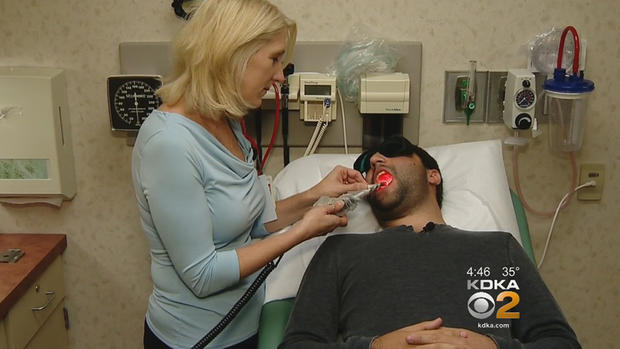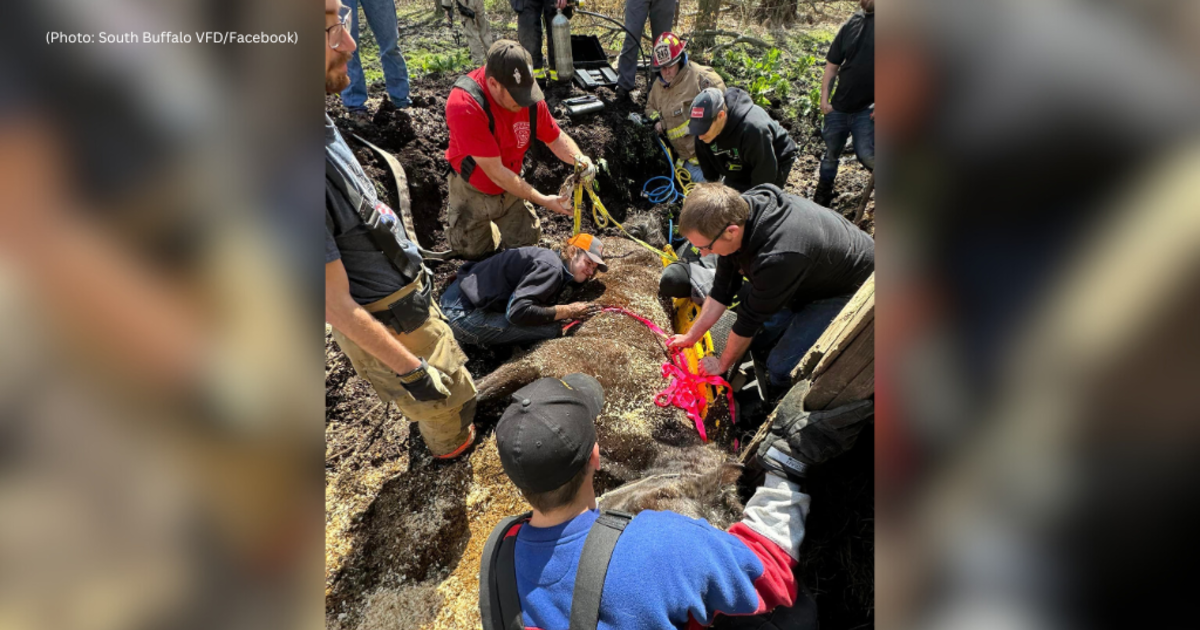Revolutionary Laser Light Therapy Helping Cancer Patients Undergoing Chemotherapy
Follow KDKA-TV: Facebook | Twitter
PITTSBURGH (KDKA) - Pittsburgh has gained a national and international reputation for the medicine being practiced here.
New developments continue to improve a patient's quality of life even as they are being treated.
Now, a revolutionary laser light therapy is helping cancer patients undergoing chemotherapy treatments.
"To me it was the perfect thing for a radiation oncologist to be doing. We really need as a field to take ownership of this." Dr. David Clump said.
Dr. Clump is a radiation oncologist who works at UPMC Shadyside Hospital. He is a Medical Doctor who also has a Ph.D., and he is very excited about how doctors and nurses in Pittsburgh are treating a major side effect suffered by cancer patients who are going through chemotherapy treatments.
"We have been using a different spectrum of radiation within the visible light spectrum to try to help heal sores," he said.
The therapy is called photobiomodulation, which is a form of laser light therapy. Teams at UPMC Shadyside Hospital use it to treat the mouth sores that often are the result of chemotherapy. The medical term for the sores is oral mucositis.
They look like massive ulcers and are extremely painful.
Max Feinberg recently finished his cancer treatments after being diagnosed with Hodgkin's and non-Hodgkin's Lymphoma. He went through five rounds of chemotherapy as doctors worked to kill a massive tumor in his chest. He lived through having painful sores in his mouth.
"Generally, the sores would appear about two to three to four days after treatment was finished, and they were pretty debilitating," said Feinberg.
The sores kept him from eating and made it excruciating to swallow. It even hurt to breathe.
Doctors often resort to prescribing opiates to because of the pain.
"In the head and neck practice," says Dr. Crump, "Seventy to 80 percent of patients will end up on pain medication because of sores within their oral cavity."
Annette Quinn is an oncology nurse at UPMC Shadyside with 27 years experience working with cancer patients like Feinberg.
"Patients will come in and they will say, 'I can't eat. I am in so much pain.'" Quinn said. "'I can't go to work. I can't enjoy my family.' They are getting feeding tubes."
She says that having a treatment like photobiomodulation gives her something that works.
"To now have this has totally been a game changer in our population," Quinn said.
Each laser light treatment takes about five minutes. One unit focuses light on the face and jaw-line. Another is used to treat sores on the roof of the mouth. Patients and doctors are very encouraged by the way low-level laser light helps wipe out the debilitating sores.
The use of light in the treatment of medical conditions is certainly not new.
"The common one that most people know about is babies that are born jaundiced," says Dr. Crump. "The one thing to do is you place them under a UV light. That jaundice goes away. So light has been used in medicine, it's just not the first thing we think about."
Feinberg is a huge proponent of photobiomodulation. Quinn treated him with it several times after his chemo treatments at Shadyside. After a three or four treatments, the sores went away. When the sores went away, it meant that Max could eat, sleep, and stay healthier. By staying strong, it also meant Feinberg never missed or had to postpone a chemo treatment. He says being able to stay on schedule with his treatment protocol meant everything to him.
"You are worried about the cancer continuing to grow while you are unable to treat it. So any sort of treatment that they could offer to keep you on schedule is a good thing," Feinberg said.
Dr. Clump says without the sores, patients can continue chemo.
"If we are able to keep patients on treatment, that's going to likely correlate to better outcomes," he said.
Patients say the treatment is painless. Physicians say it works quickly. Each photobiomodulation unit costs about $22,000, which is not a lot of money when it comes to buying medical devices.
Research in Brazil, India, Europe and some in the United States say photobiomodulation shows no side effects.
Quinn has spent nearly three decades as an oncology nurse. She is very happy to be able to find something that helps her patients recover after chemo treatments.
"Oral mucositis has always been my passion. It's what I did all my masters work in. And when you finally can say, 'OK, problem solved.' We are doing something. We have made great strides," Quinn said.
The best news for Feinberg is not that his sores are gone. His cancer is gone, too.
"I am cancer free, and I am currently in remission. I owe a lot of that to the doctors here. They are phenomenal here. They really are," Feinberg said.
He believes the laser light treatment helped him beat cancer.
"To me, it is something that if there is a doctor telling you to try it, give it a go," Feinberg said.




